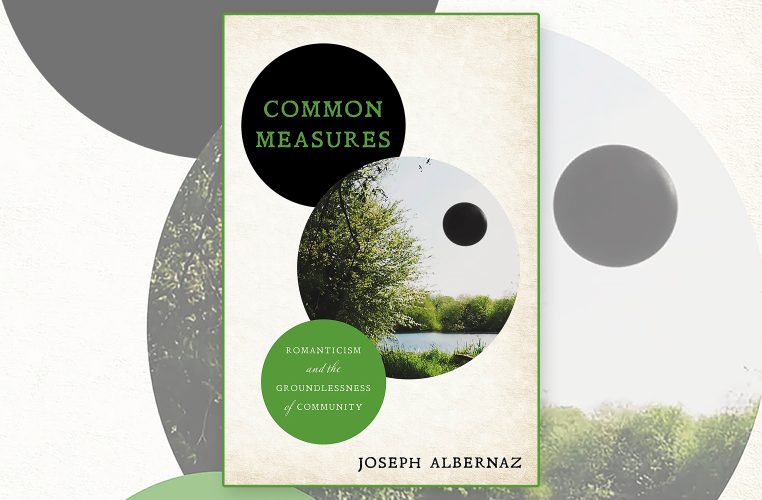Events
Registration required even by CU/BC ID holders
Cosponsors
- Office of the Divisional Deans in the Faculty of Arts and Sciences
- Department of English and Comparative Literature
Organizer
- The Society of Fellows and Heyman Center for the Humanities
Contact
email address [email protected]

Common Measures: Romanticism and the Groundlessness of Community
by Joseph Albernaz
What happens to the experience of community when the grounds of communal life collapse? The Romantic period's upheaval cast both traditional communal organizations of life and outgrowths of the new revolutionary age into crisis. In this context, Joseph Albernaz argues that Romantic writers articulate a vital conception of "groundless community," while following this idea through its aesthetic, ecological, political, and philosophical registers into the present.
Amidst the violent expropriation of the commons, Romantic writers including the Wordsworths, Clare, Hölderlin, and the revolutionary abolitionist Robert Wedderburn reimagined the forms of their own lives through literature to conceive community as groundless, a disposition toward radically open forms of sharing—including with nonhuman beings—without recourse to any collective identity. Both a poetics and ethics, groundless community names an everyday sociality that surges beneath and against the enclosures of property and identity, binding us to the movements of the earth.
Unearthing Romanticism's intersections with the history of communism and the general strike, Albernaz also demonstrates how Romantic literature's communal imagination reverberates through later theories of community in Bataille, Derrida, Nancy, Moten, and others. With sharp close readings, new historical constellations, and innovative theoretical paradigms, Common Measures recasts the relationship of the Romantic period to the basic terms of modernity.
About the Author
Joseph Albernaz is an Assistant Professor of English and Comparative Literature at Columbia University. He specializes in the literature, especially poetry, of the Romantic period, with a particular interest in the legacies of Romanticism across a number of theoretical and critical domains. His first book, Common Measures: Romanticism and the Groundlessness of Community (Stanford University Press, 2024), reads writers from Geneva to Jamaica to trace new formations of community, ecology, and the every day in Romantic literature and its later inheritors. Broadly speaking, his recent work seeks to place close and comparative literary analysis in convergent dialogue with philosophical inquiry and with historical trajectories of insurgency and revolt. He is currently working on a second book, tentatively entitled "The Time Torn Remnant of the Holiday," on calendars, festivals, work, temporality, and rebellion.
About the Speakers
Branka Arsić is the Charles and Lynn Zhang Professor of English and Comparative Literature at Columbia University. She specializes in literatures of the 19th century Americas and their scientific, philosophical, and religious contexts. She is the author, most recently, of Bird Relics: Grief and Vitalism in Thoreau (Harvard University Press, 2016), which was awarded the MLA James Russell Lowell prize for the outstanding book of 2016. It discusses how Thoreau related mourning practices to biological life by articulating a complex theory of decay, and proposing a new understanding of the pathological. She has also written On Leaving: A Reading in Emerson (Harvard UP, 2010), and a book on Melville entitled Passive Constitutions or 7½ Times Bartleby (Stanford UP, 2007).
Denise Cruz writes and teaches about gender and sexuality in national and transnational cultures in the Department of English and Comparative Literature at Columbia University, where she is also the chair. She uses spatial and geographic frameworks (from the transpacific, to the regional, to the Global South) to examine previously unstudied archives (from the first works of English literature by Filipina and Filipino authors, to private papers that document connections between the Midwest and U. S. empire, to fashion shows in Manila). She contends that this combined analytical and archival approach extends our understanding of the importance of national, regional, transnational, and global dynamics in North America, the Philippines, and Asia.
Colin Jager is an Associate Professor of English at Rutgers University. Since 2019, Colin has been the Director of the Center for Cultural Analysis, although his association with the Center dates back to his first year at Rutgers in 2000-01. He is the author of The Book of God: Secularization and Design in the Romantic Era and Unquiet Things: Secularism in the Romantic Age, both from the University of Pennsylvania Press. His articles have appeared in Modern Language Quarterly, Public Culture, Theory and Event, and Literature Compass.
Emily Sun is an Associate Professor in Comparative Literature and Translation Studies at Barnard College. Her research interests include British and continental European Romantic and nineteenth-century literature, cross-cultural literary relations between China and the West, literary theory, politics and aesthetics, and psychoanalysis and literature. She is the author of On the Horizon of World Literature: Forms of Modernity in Romantic England and Republican China (Fordham University Press, 2021), Succeeding King Lear: Literature, Exposure, and the Possibility of Politics (Fordham University Press, 2010) and co-editor of The Claims of Literature: A Shoshana Felman Reader (Fordham University Press, 2007).
Please email [email protected] to request disability accommodations. Advance notice is necessary to arrange for some accessibility needs. This event will be recorded. By being present, you consent to the SOF/Heyman using such video for promotional purposes.
